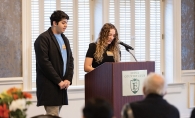As high school students look forward to college, many will take the American College Test, or ACT. The ACT is a three-hour multiple-choice exam designed to measure academic achievement in five curriculum areas: English, mathematics, reading and science, Writing and reasoning. A good ACT score can be integral to college admission. To ensure good test preparation, many Edina students turn to tutors and test prep companies such as Thomas Lamosse at Junior Genius ACT Mentoring.
His students call him “Professor Thomas.” Lamosse has degrees in psychology and kinesiology from the University of Minnesota and is pursuing a Ph.D. in linguistics at the Chulalongkorn University in Thailand, where he teaches a Thai language course five months of the year. During the other seven months, Lamosse teaches local students best practices for ACT test-taking. His one-on-one training sessions and video tutorials are designed to help students test well or improve their past ACT test scores.
“Reading is the most difficult part of the ACT,” says Lamosse. “This techy millennial generation doesn’t read for fun. Because of that, many often receive low ACT test scores because they are unable to finish in the time allotted.” Lamosse claims his “genius mapping” techniques can help students increase reading comprehension and speed by 300 percent. His specialization in reading aids students in overall ACT test-taking, since the math portion of the test includes deciphering math story problems, and the science portion is set up in paragraph form. There is also an essay section that Lamosse thinks can be better tackled when students have improved reading skills.
Lamosse states that one of the biggest misconceptions students have about taking the ACT is assuming that having a high GPA automatically translates into a high ACT score. “Students are rewarded with good grades in school by completing homework and project assignments in addition to scoring well on quizzes and tests,” says Lamosse. “But scoring high on the ACT has less to do with what you accomplish in high school and more to do with applying good test-taking strategies.”
According to Lamosse, a key test-taking strategy is to think simply and to not get bogged down in details while reading or listening to a person speak. “I observe student behavior to determine a student’s best learning style,” says Lamosse. “Then I help them think big-picture, more like a genius would think.”
“I didn’t originally hire Thomas for ACT test prep,” says Susan Strobel of Edina. “I hired him to help mentor our son Jack, who did well in school but didn’t take it very seriously. Then our younger son Tyler started the program to gain an academic edge. Thomas is a ferocious academic and an incredible mentor to teens. Our sons see themselves differently, better, since working with Professor Thomas.”
Lamosse notes that most private colleges seek ACT test scores of at least 24, and larger state schools often require scores as high as 28 or 29 out of a total possible 36. “Students can take the ACT as many times as they like,” says Lamosse. “And higher scores can mean better chances of admission and better scholarship opportunities.”
The “junior genius” method includes seven one-on-one training sessions followed by unlimited access to his weekly video training sessions and practice tests at a local library. “The difference between using my video tutorials and those from another company,” says Lamosse, “is that students are getting the same teacher in person and on the video using the same terminology and teaching methods so there is no confusion.”
Menu
From the November 2013 issue
College Admission Test Prep with Professor Thomas
“Professor Thomas” helps students prepare for the ACT.
Professor Thomas Lamosse helps local students improve their ACT testing skills.
Photo by:









